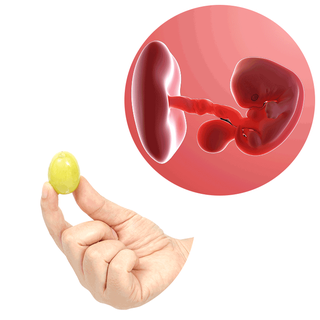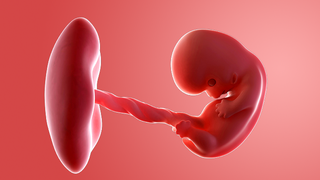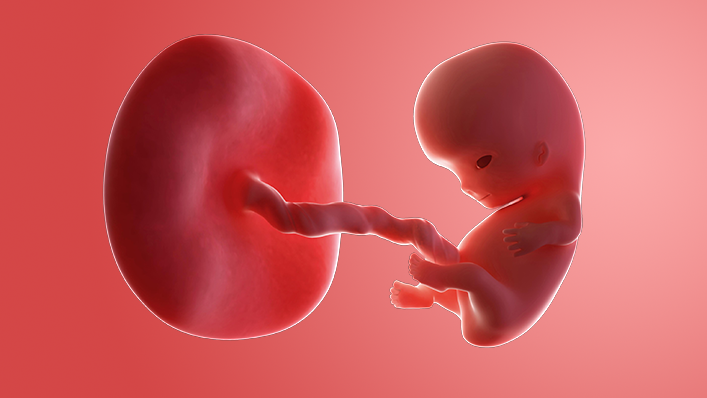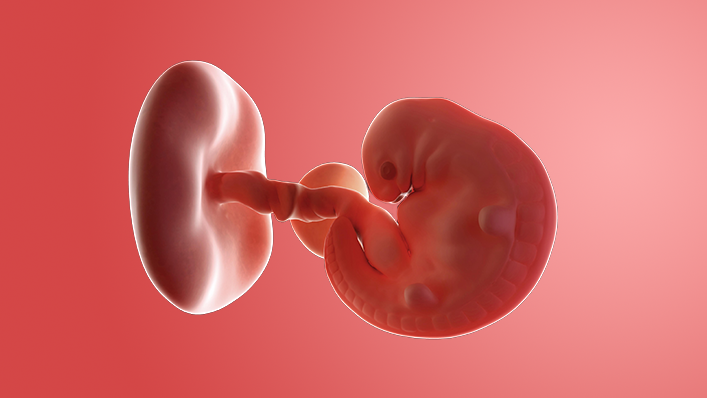Week 7
Have you started to share the news yet? When you start telling friends and family is entirely up to you.
Legally you do not have to tell your employer until the 15th week before the baby is due, which is about 4 months away.
What's happening in my body?
There's more blood pumping around your body than there was 7 weeks ago.
As you go through your pregnancy, the volume will increase by up to 50%. The extra blood will feed your uterus (womb) with all the oxygen and nutrients that your baby needs.
This can make you feel thirstier than usual. Try to drink 8 medium glasses of fluid a day (such as water, fruit tea, fruit juice, skimmed or semi-skimmed milk).
Meanwhile, your womb is now about the size of a lemon, while your baby is the size of a grape and growing very quickly.
If it's your first pregnancy, you may not start looking pregnant until around week 12.
If you have had a baby before, you may look pregnant earlier than you did last time, as your womb and stomach muscles will be more stretched.
When's my baby due?
If you want to work out when you baby's due, use the NHS's pregnancy due date calculator.
You'll get a more accurate date from your doctor or midwife when you have a dating scan (usually at 8 to 14 weeks).
Early pregnancy symptoms (at 7 weeks)
Being 7 weeks pregnant can feel quite challenging if you're feeling sick, tired and experiencing mood swings.
Your symptoms could also include:
- a metallic taste in your mouth
- sore breasts
- headaches
- new food and drink likes and dislikes
- a heightened sense of smell
- a white milky pregnancy discharge from your vagina
- light spotting (see your doctor if you get bleeding in pregnancy)
- cramping, a bit like period pains
- darkened skin on your face or brown patches – this is known as chloasma or the "mask of pregnancy"
- thicker and shinier hair
- bloating (read about bloating on week 16's page)
- morning sickness (see week 6 for morning sickness remedies)
Strange symptoms
Don't ignore any strange symptoms, like feeling itchy all over.
The chances are that those aches or pains are just signs of a normal pregnancy, but talk to your midwife or doctor, just in case.
What does my baby look like?
Your baby, or embryo, is around 10mm long from head to bottom, which is about the size of a grape.
The brain is growing faster than the rest of the body, so they have a large forehead. There are small dimples where the nose and ears will be. The eyelids are beginning to grow and cover the eyes.
The little limb buds are starting to form cartilage which will make the bones for the arms and legs. The arm buds are getting longer, and the flattened ends will soon become tiny hands.
The baby's brain and spinal cord are taking shape at a fast pace. Your embryo is generating around 100 new brain cells every minute.
Remember to take your folic acid as it can help prevent defects in your baby's development.

Action stations
Sexually transmitted infections (STIs)
Do you think you or your partner could have an STI? If so, get checked out, as this could affect your baby's development. Talk to your midwife or GP, or visit a sexual health clinic.
Long-term conditions
If you have a long-term health condition, then let your specialist or GP know you're pregnant as soon as possible.
Don't stop taking any regular medication without discussing it with your doctor first.
Losing a baby
A miscarriage is the loss of a baby in the first 23 weeks.
The NHS website has information on the symptoms, causes and what happens during a miscarriage.
More in week-by-week

Week 8
You might be feeling bloated and you may have slightly swollen breasts, but it will probably be a few more weeks before you start looking pregnant.
More in week-by-week guide to pregnancy


